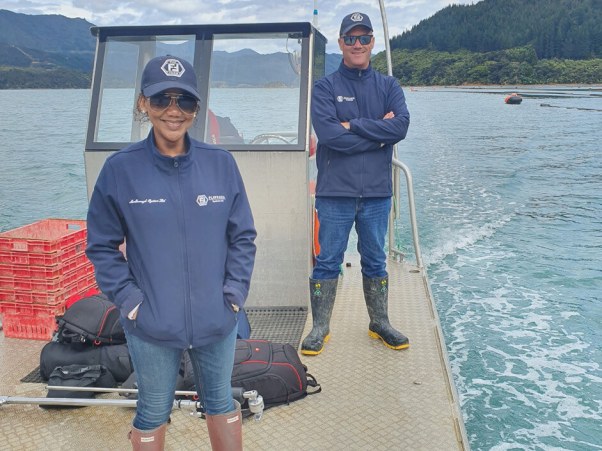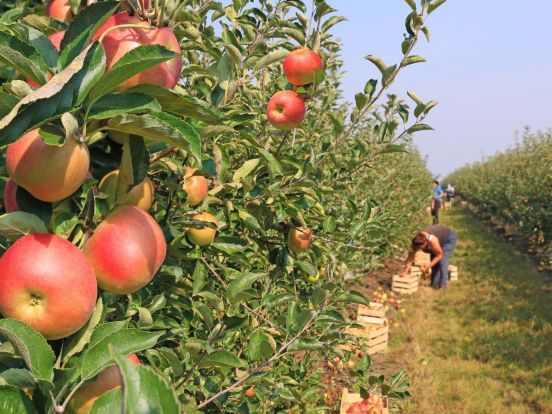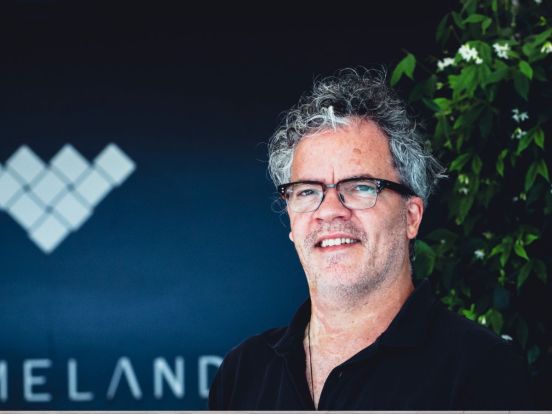A humble Marlborough oyster farming business has put Kiwi ingenuity on the world stage after developing and designing its own innovative, semiautomated oyster growing system.
In just two years Marlborough Oysters owners Aaron and Debbie Pannell now have their FlipFarm Systems technology patented and sold in 12 countries, operating on 70 oyster farms worldwide.
Late last year (Nov, 2021) the couple fended off 39 other applicants from 24 countries to scoop the 2021 Global Aquaculture Innovation Award at the Global Seafood Alliance Awards, held virtually. Now recognised as world leaders in oyster farming technology, their systems ensure delivery of a superior, quality product. Previously, under the old manual system, it was heavy work involving a lot of heavy physical lifting, says Aaron.
The former system proved ineffective and the equipment would wear out and during stormy weather they would lose hundreds of oyster growing bags. This not only impacted their bottom line, and negatively impacted the environment, but meant staff were regularly called on to make repairs and retrieve lost equipment. “All individual baskets or bags would have to be removed numerous times during the two-year growing cycle with lots of repetitive handling required,” he says. “We had a dozen fit guys working on this, but we were finding it difficult to retain staff, our equipment would also break free and wash up on the shore.”
Through “a series of random circumstances” Aaron says he came up with the line of attached baskets that can be manipulated automatically.
They can also be operated from machinery attached to thecompany’s boats. “We can also flip the baskets over and sit them on their float, elevating them out of the water. This dries out any biofouling – a process called desiccation, killing any fouling larvae.”

It’s important for the oysters to spend a short time out of the water as this develops the muscle they use to hold their shells together when out of the water. “They need that strengthening exercise to provide good shelf live after harvest,” says Aaron. Oysters are normally grown in shallow, muddy, tidal type waters but these are cultivated in 12 metres of water. Growing in deeper, more oceanic water ensures a cleaner, higher quality oyster and a fresher flavour. “They’re quite high in salinity and there’s no muddy aftertaste. It’s a very clean shell because of the wave movement.”
There have been social advantages too. “Because our process is now more mechanised we can employ staff from different demographics and backgrounds, as there’s less physical strength involved,” he says. In recent times we have employed more mature, experienced staff and a number of women which has been a really nice byproduct for our company culture.”
Debbie, a global traveller and corporate girl, worked in the optical industry for seven years before meeting Aaron 20 years ago. With her background Debbie was clearly out of her comfort zone when she became involved in the aquaculture industry with Aaron. A former sheep, beef and dairy farmer, Aaron was mussel farming in Marlborough then and has 30 years’ experience in aquaculture. Debbie can now shuck an oyster with the best of them and is fully hooked on the flavours. She’s even ended up teaching a few chefs how to shuck their product efficiently. “It’s quite a cool party trick,” grins Aaron. “Many people find shucking intimidating, but there’s a secret technique and once people know how to do it, it’s easy.”

“Our flavour is unique because of where our oysters are grown, Just like wine has “terroir”, oysters have “merroir”. They take up the flavours of their environment. We’ve even converted some die-hard Bluff oyster lovers.”
Because they’re produced in a hatchery, their Marlborough oysters are not seasonal, but available year round, making for a consistent product for restaurants, cafes and bars. “We’re hoping to educate chefs that we’re year round and will have a consistently high quality product available for their menu planning.”
“We really want to get more people eating oysters. Thirty years ago fresh salmon was rare then companies like Ora King Salmon came onto the scene and it became a staple,” he says. “We want oysters to be a staple here in New Zealand like they are in Australia.” Australia produces and consumes 10 times more oysters than New Zealand eats.
For these guys sustainable and local is what it’s all about and Kiwis won’t get the leftovers, as is the case with much of New Zealand’s top produce that’s exported overseas.
“We have a real focus on the domestic market,” says Aaron. “A lot of our best product in New Zealand is exported overseas. We want to keep our premium oysters to sell on the local market.” The rest will be exported. While Marlborough Oysters can be frozen they’re definitely preferable freshly shucked.
Marlborough Oysters supplies top local restaurants, including Cloudy Bay Jack’s Raw Bar, Harvest Restaurant Blenheim, Wither Hills Restaurant and Escape to Picton. The company also supplies a number of other restaurants on order from time to time.
On occasions visiting chefs pick up on the quality and flavours and Aaron and Debbie end up couriering their oysters all over the country. Early this year they’ll be setting up distribution channels throughout New Zealand under the Marlborough Oysters brand. The couple recently purchased an export pack-house in nearby Blenheim.
Marlborough Oysters is now one of New Zealand’s largest oyster producers, producing New Zealand’s top oyster four years in a row. The company operates under stringent, environmentallyfriendly requirements through its involvement with Aquaculture NZ A+, a national sustainability management system. Marlborough Oysters is also a member of the local Marine Farm Association and recently achieved ‘gold’ standard in their environmental management program.
Aaron and Debbie were totally surprised and absolutely delighted to score the international Global Seafood Alliance innovation accolade recently. “We believe it’s the first time someone from New Zealand has won this, or even made the finals,” says Aaron.








